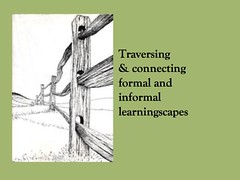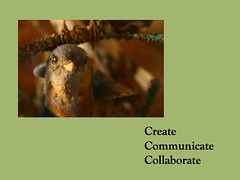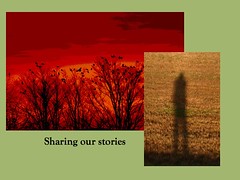This is one possible workshop agenda as it contains many elements I anticipate will be of use and of interest to the group. But if the group wishes to move in a direction other than this one, we'll do that by all means. I am a believer in teaching in the moment.
I. Introductions:
BG: Why I do what I do and where.
II. The core of our work: deep learning
Exercise:  deeplearning.doc Here's one of my blogposts, about how I open my semesters, including the use of this deep-learning exercise.
deeplearning.doc Here's one of my blogposts, about how I open my semesters, including the use of this deep-learning exercise.
III. Discussion about what the group hopes to get out of this workshop.
IV. The Learning Landscape Discussion: Web 2.0

What skills do our students have when they reach our door?
What are their expectations? Their goals?
Divides and gaps---spectrum of digital nativeness, participation gap, divide between adult and child use of the internet
What do they need to know? Karl Fisch-inspired presentation on Web 2.0 application SlideShare, Shift Happens

Old and New Literacies
V. The Teaching Landscape Discussion
What are your attitudes around the role of a teacher in a student's learning journey?
Progressive teaching practices: Vygotsky, Dewey, Arendt, Greene, hooks,
Freire, Bruner , John-Steiner
Teaching and Learning Online: Levy, Rheingold, Jenkins, Landow, Bolter, Gee, and many more
Important to keep at forefront of our design/mentoring of learning opportunities:
--the social nature of learning,
--the urge to create
--the desire to tell our story, to communicate
--the significance and power of informal learning (what does this mean for formal learning)
--how do we know and show what we have learned (self-evaluation)

V. What does Web 2.0 apps have to do with fostering deep learning within (even) traditional formal learning environments?
Watch the Mark Wensch Youtube movie
Exploring Blogging, wiki-creation, podcasting, tagging , RSS and other social software can honor and value the INDIVIDUAL voice/role while setting the stage for RECIPROCAL APPRENTICESHIPS and INTEGRATING INFORMAL LEARNING, opening the mind, the eye, the canvas in interactions beyond the classroom community.
Teacher must take an open, creative, fluid, emergent approach to what goes on in the classroom--learning as social, collaborative and connected, transparent and fluid.
A. Individual Voice/Role
--self-confidence
--self-awareness
--efficacy
1. Storytelling ---blogging , videoblogging, image-sharing, podcasting, RSS
Exercise: The role of storytelling in your classroom What stories are told by whom? How? When? Why?
Group A) Answer the question by leaving a comment on the practice blog.
Group B) Put together a story without words in five images from BG's Flickr site by posting thumbnails of the five images in a new post on the blog.
Group C) Take a look at several blogs listed and create a post on the practice blog that includes links to ones with appealing design and structure.
Group D) Podcasts: find a podcast you would like your students to listen to and link to it on a blogpost.
Group E) Open up a Bloglines account for yourself and add at least five blogs you'd like to follow.

2. Deeper thinking -- slow-blogging ongoing posting moving past the surface
"How do I know what I think until I see what I say?" The individual's story within the group context.
tagging : awareness of how you understand what you understand (an example from a chemistry class)
Wiki to organize one's work, knowledge
3. Reflecting, connecting back to earlier thinking, creating the story of the course, building a portfolio: Helen Barrett's Web 2.0 and eportfolios

B. Reciprocal Apprenticeships
--blogs: informal conversations, archived blogs, links, comments: taking a look at a Motherblog; RSS; image-sharing; tagging
--wiki creation: to deepen and extend the learning through collaborative text-building
Exercise: introduce yourselves on the wiki
how wikis are being used in classrooms : Wiki book created by an undergraduate class, Michigan State language classrooms, a wiki for Master teachers
University of Michigan for science teaching , UVTI teacher training wiki, English class ceating a Marx wiki
Blog and wiki integration
--digital storytelling process (here are a couple of my blogposts about how I use digital storytelling, here and here;
--immersive gaming environments, ArtMobs, group portraits, group mapping, social bookmarking, digital history project
C. Interactions Beyond the Classroom Community
--Synchronous Discussion
-- Blogging invitationals, blogging fieldtrips

--Moving beyond the classroom blogs and wikis and social networks
ning, Classroom 2.0 ning site
Second Life, an article in UCLA's Magazine about Second Life in Higher Ed), examples of architecture classes using Second Life
Second Life in Teacher Education
Learning Commons a la University of Manitoba
Comments (0)
You don't have permission to comment on this page.